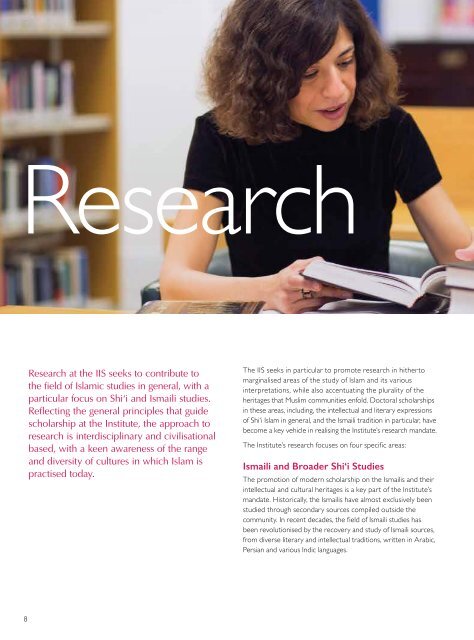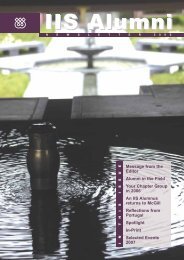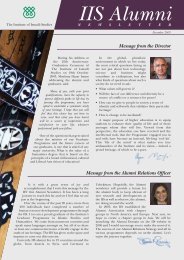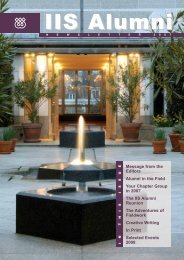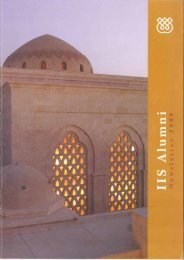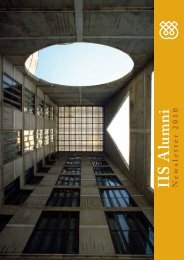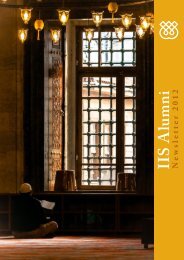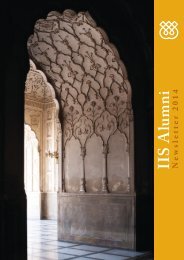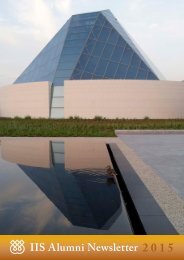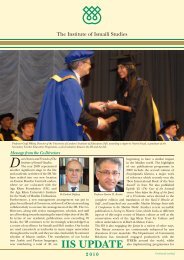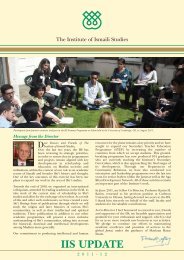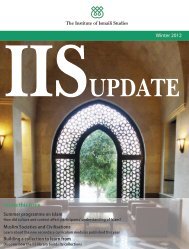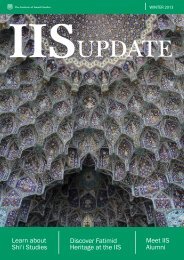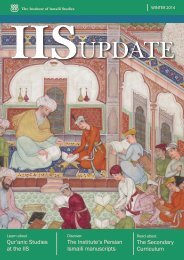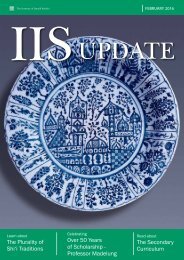IIS Brochure 2017
Create successful ePaper yourself
Turn your PDF publications into a flip-book with our unique Google optimized e-Paper software.
Research<br />
Dr Asma Hilali with Dr Stephen Burge, Research Associate at the <strong>IIS</strong>. Image credit: Mindaugas Orlauskas.<br />
Research at the <strong>IIS</strong> seeks to contribute to<br />
the field of Islamic studies in general, with a<br />
particular focus on Shi‘i and Ismaili studies.<br />
Reflecting the general principles that guide<br />
scholarship at the Institute, the approach to<br />
research is interdisciplinary and civilisational<br />
based, with a keen awareness of the range<br />
and diversity of cultures in which Islam is<br />
practised today.<br />
The <strong>IIS</strong> seeks in particular to promote research in hitherto<br />
marginalised areas of the study of Islam and its various<br />
interpretations, while also accentuating the plurality of the<br />
heritages that Muslim communities enfold. Doctoral scholarships<br />
in these areas, including, the intellectual and literary expressions<br />
of Shi‘i Islam in general, and the Ismaili tradition in particular, have<br />
become a key vehicle in realising the Institute’s research mandate.<br />
The Institute’s research focuses on four specific areas:<br />
Ismaili and Broader Shi‘i Studies<br />
The promotion of modern scholarship on the Ismailis and their<br />
intellectual and cultural heritages is a key part of the Institute’s<br />
mandate. Historically, the Ismailis have almost exclusively been<br />
studied through secondary sources compiled outside the<br />
community. In recent decades, the field of Ismaili studies has<br />
been revolutionised by the recovery and study of Ismaili sources,<br />
from diverse literary and intellectual traditions, written in Arabic,<br />
Persian and various Indic languages.<br />
Through its research, the Institute aims to contribute towards a<br />
more representative understanding of Shi‘i communities, situating<br />
them within the wider context of Islam. Scholars and research<br />
fellows also explore the traditions of Shi‘i Islam, considering the<br />
origins and early developments of various Shi‘i communities, as well<br />
as the intellectual and spiritual traditions of Shi‘i Muslims. These<br />
include topics related to theology, philosophy, law, hadith (prophetic<br />
traditions), tafsirs (commentaries and interpretations of the Qur’an),<br />
as well as Shi‘i contributions to the arts and humanities.<br />
Qur’anic Studies<br />
A research unit specifically focusing on Qur’anic Studies was<br />
established at the <strong>IIS</strong> in 2000, with the aim of promoting scholarship<br />
on the plurality of interpretations inspired by the Qur’an. Research<br />
and teaching about these interpretive traditions advance knowledge<br />
of the entire spectrum of sources and interpretations of Qur’anic<br />
tafsirs throughout Muslim history, whilst also shedding light on the<br />
various contexts and methodologies that have shaped them.<br />
Constituency Studies<br />
Constituency Studies engages in textual, historical, sociological<br />
and anthropological research, considering the diverse global<br />
contexts within which Ismaili communities live. It aims to explore<br />
the history, oral history and traditions of Ismaili communities and<br />
their heterogeneous contemporary realities, thereby informing<br />
the educational programmes of the <strong>IIS</strong>.<br />
Central Asian Studies<br />
The Central Asian Studies Unit examines the history, culture<br />
and traditions of the Ismaili and wider Shi‘i communities within<br />
the broader context of Muslim societies in Central Asia. The<br />
geographic scope of this research includes Tajikistan, Afghanistan,<br />
Northern Pakistan, Western China and the Russian Federation.<br />
8<br />
www.iis.ac.uk/research<br />
9


